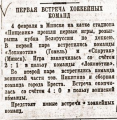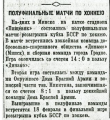Belarus
| Belarus | |
| Continent | Europe |
| Population | 9,503,807 |
| Registered players | 4,374 |
| Referees | 128 |
| Rinks | 31 |
| National teams | Men's Junior |
| National federation | Belarus Ice Hockey Federation |
| IIHF since | May 6, 1992 |
| IIHF ranking | 11 |
| Top league | Belarusian Extraliga |
Belarus is a country in Eastern Europe. Minsk is the capital and largest city. Belarus was a part of the Soviet Union until 1991.
Overview
National Teams
Domestic Teams
See Category:Ice hockey teams in Belarus
Arenas
See Category:Arenas in Belarus
Competitions
| Competition | Founded | Folded | Notes |
|---|---|---|---|
| Belarusian Extraliga | 1992 | - | Top-tier national competition |
| Vysshaya Liga | 2002 | - | Second-tier national competition |
| Belarusian Cup | 2002 | - | National cup competition |
| Belarusian 2nd League | 1995 | 1996 | Defunct second-level competition |
| Belarusian SSR Championship | 1952 | 1991 | Defunct Soviet-era competition |
| Belarusian junior competitions | - | Various junior competitions |
- Other competitions
History of hockey in Belarus
Back when it was known as Wolkowysk and part of Polish territory, ice hockey was first played in the Belarusian city now known as Vawkavysk in 1932. Three teams (WTS Wolkowysk, Makabi Wolkowysk, and Przyszlosc) played games against one another. There was also a club named ZSS in the neighboring town of Swislocz (today Svislach).[1] The sport was also picked up in Brest around 1930. The first official ice hockey game in Grodno took place on January 24, 1932, with Cresovia Grodno facing AZS Vilnius. In February 1934, the two sides met again, with AZS winning 6-4. Cresovia had formed a permanent hockey team that January, and there were plans to hold a hockey tournament for the Grodno Cup.[2]
During the winter of 1940, students of the Minsk Institute of Physical Culture traveled to Brest to face a city team, who they defeated 7-2, in the first ice hockey game to be played in the Belarusian SSR. Brest had been ravaged by the war, and was unable to field a competitive team against Minsk. The Soviets disbanded all the local clubs - “Rukh”, “Pogon”, “Kresy”, “Strzalec”, "Maccabi", "ZhTS", and "ZhKS", replacing them with impersonal “Spartak” and “Dynamo”.[3][4][5]
In 1945, the Committee on Physical Culture and Sports under the Council of People's Commissars of the BSSR held a draw for the Hockey Cup of the BSSR. The cup was drawn according to the rules approved in 1942 by the All-Union Committee on Physical Culture and Sports under the BSSR of the USSR, and utilized the single-elimination format. The winning team was to be awarded with a diploma and a challenge prize - a cup of the Committee for Physical Culture and Sports under the Council of People's Commissars of the BSSR. Nine teams were set to compete in the tournament: Spartak and Bolshevik from Grodno, Spartak, Dynamo, Labor Reserves and the District House of the Red Army (ODKA) from Minsk, the Military team of Comrade Nikitin, and city teams representing Gomel and Brest.[6]
On January 9, 1945, players in Gomel began training for the competition. The first BSSR Cup games took place in Minsk on February 4, 1945. In the first game, Lokomotiv Gomel beat Spartak Minsk 2-1, and the Military team of Comrade Nikitin defeated Brest 4-0.[7] The tournament concluded on February 18, with ODKA Minsk defeating Dynamo Minsk 6-0.[8]
- 1945 Cup of BSSR news reports
In 1946, the country's most successful team, Torpedo Minsk (later Vympel and Dynamo Minsk, and now Tivali Minsk) was founded. The club initially played in the second-tier Klass B in 1947-48, before giving way to Spartak Minsk, who first qualified for the top-level Soviet Championship League in 1951.
There were plans to hold a Minsk Hockey Cup in January 1948, with nine teams, among them Dynamo Minsk, participating, but no results were subsequently reported. There was also a Blitz Tournament, featuring the "best teams of Minsk", which Dynamo also competed in, and was won by ODKA.[9] In 1950, the second tournament for the prize of the opening of the season was held in the Belarusian capital, as well as the first championship of Minsk, which, however, was not completed due to bad weather. Spartak Minsk won the third prize of the opening of the season in 1951, defeating Dynamo Minsk 1-0 in the final. Six teams participated.
During Soviet times there was also a "national" competition staged within the Belarusian SSR, the Belarusian SSR Championship. It was planned to stage the competition for the first time in 1950, with teams from Bobruisk, Vitebsk, Gomel, Brest, Pinsk and two from Minsk participating, but warm weather prevented this. The BSSR Championship debuted in 1951, and was won by Spartak Minsk.[10]
The interest for hockey has always been pretty good in Minsk. The home stadium of Dynamo Minsk often drew a capacity crowd of 5000 to the games. One of the Minsk stars from the 1960s was Victor Yaroslavtsev who became a world champion with the Soviet National Team in 1967. He only played 15 games for the Soviets and scored 3 goals but he was a very important player on his club for years. Other good Belarusian players between the 1950s and the 1970s included: Sergei Babariko (goalie), S. Sitkovskij, J. Nikonov, Victor Shilov, S.Malkov, V. Loschinin and G. Tincenko.
In 1992, the Belarus Ice Hockey Federation became independent after the dissolution of the Soviet Union. Belarus joined the IIHF on May 6, 1992.[11]
The Belarusian Extraliga started play in the 1992-93 season. In the 2004-05 season, the league admitted teams from Latvia and Ukraine. By 2013-14, only Belarusian teams were left playing in the league. Yunost Minsk has won the most league titles, with six. Other successful clubs include HK Neman Grodno and Tivali Minsk The Belarusian Cup has been contested annually since 2002.
The Belarusian National Team first participated in the C-Pool Qualification tournament in 1992, in an attempt to qualify for the 1993 World Championships. They failed to qualify for the tournament due to having a lower goal quotient than Kazakhstan, with whom they were tied in the standings, and made their debut at the 1994 World Championship Pool C.[12]
They enjoyed success shortly thereafter, and played in the A-Pool in 1998. Belarus participated at the 1998 Olympics, finishing in 7th place. Four years later in Salt Lake City, they took fourth place at the tournament, losing to Russia 7-2 in the bronze medal game. Their 4-3 win over Sweden in the quarterfinals was a monumental upset, if not fluky, as Vladimir Korpat scored the winning goal from center ice with 2:22 remaining. Belarus failed to qualify for the 2006 Olympics in Turin, but qualified for the 2010 Vancouver Olympics, in which they finished in ninth place.
The junior national team made its debut at the IIHF World U20 Championships in 1993. They first qualified for the A-Pool in 1999. The team has made 20 appearances at the world juniors, with their best finish being ninth in 2001 and 2002.
Some of the best Belarusian players over the years have been: Andrei Mezin, Andrei Skabelka, Andrei Andrievski, Ruslan Salei, Oleg Khmyl, Sergei Fedotov, Andrei Prima, Mikhail Grabovsky, Konstantin Koltsov, Vladmir Tsyplakov and Igor Matoushkin, many of whom having gone on to play in the National Hockey League.
References
- ↑ Championnat de Pologne 1931/32
- ↑ История Лед и пламя. Реальная дата отсчета гродненского хоккея и зимних видов
- ↑ Хоккей с шайбой
- ↑ Hockey in Belarus
- ↑ Polish roots and a miracle at the Olympics: amazing facts about Belarusian hockey
- ↑ Хоккей Беларуси: начало
- ↑ Хоккей и лесоповал последней военной зимы
- ↑ [1]
- ↑ Dynamo Minsk - 1948
- ↑ Dynamo Minsk - 1951
- ↑ Belarus - IIHF.com
- ↑ Belarus - National Teams of Ice Hockey
Credits
Special thanks to Patrick H. for supplying information on this country.



